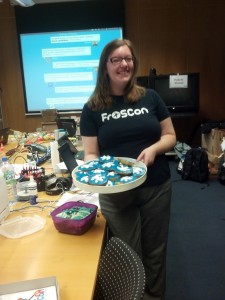
I had this phrase “europe’s open source advantage” rolling around in my head Friday as I helped pack 1500 conference swag bags. We had a team of at least twelve people standing and seated in an assembly line for two hours to complete the task.
And this is what always happens at the volunteer-run free and open source conferences. I was told that somewhere around 70 volunteers would help out today, and it’s felt like easily twice that many people have been wandering around and pitching in today.
After we were done, the woman pictured above, brought conference-themed cookies that she bakes every year for the organizing team.
Attendance at FrOSCon is estimated at 1500. FOSDEM is estimated at about 5000. Chaos Communication Congress had an attendance of 4230 in 2008. All three are volunteer organized, focused on free software, and software freedom (although CCC is also about hacking, security and politics, many people I know go to 2 or more of these events).
FrOSCon has been around for seven years, inspired into creation by the organizer’s trip to FOSDEM, another terrific free and open source conference in Brussels, Belgium. What struck me at FOSDEM, is the same feeling I’m having here in Köln/Bonn.
It’s a privilege to be here. Organizers are excited and smiling and relaxed. Speakers feel obligation to take controversial positions — like I’ve heard more than once in the last 24 hours that “if you value freedom, you won’t buy Apple products.” Also: “What do I care about patents? I live in Europe.” And as I look around, I’m one of maybe 5% of people with a Mac laptop. (Far more people have iPhones.)
I think about our conferences in the USA, and we could learn some things. Both in terms of attendance and in terms of our vision. On the point of where exactly we are losing track of the activist spirit clearly on display here… maybe it has to do with our proximity to Silicon Valley, where I was recently told “charitable giving here is often in [the] form of angel investing.”
We don’t seem to feel an obligation to volunteer and create these large general, self-sustaining conferences. We certainly have large commercial conferences, and smaller generalist conferences. SCALE I think is one example of a community that’s created a sustainable community. And I’ve heard SE-LinuxFest is growing very quickly. So maybe we’re at a turning point?
I’m giving a keynote tomorrow about computer science education. What I’m really going to talk about is computational thinking. It’s a relentless decomposition of problems, algorithms for problem solving and the practical application of those ideas – in code or not.
That’s the kind thinking I believe leads some of us from “free as in freedom” for software to the value judgements about individual hardware purchases. Or, sometimes it leads us to find space in our communities for people who exist somewhere along the freedom spectrum. 
I’ve had a chance to catch up with old friends, and make more than a few new ones. Mostly I’m looking forward to tonight’s BBQ, even if it rains. Henrik tells me that it’s what sets the whole tone for FrOSCon. People coming together to eat and drink and get to know one another over a shared feeling of belonging, out from behind their screens. And also to be openly critical of the ideas, organizations and products that threaten the foundations of free software.


 by
by